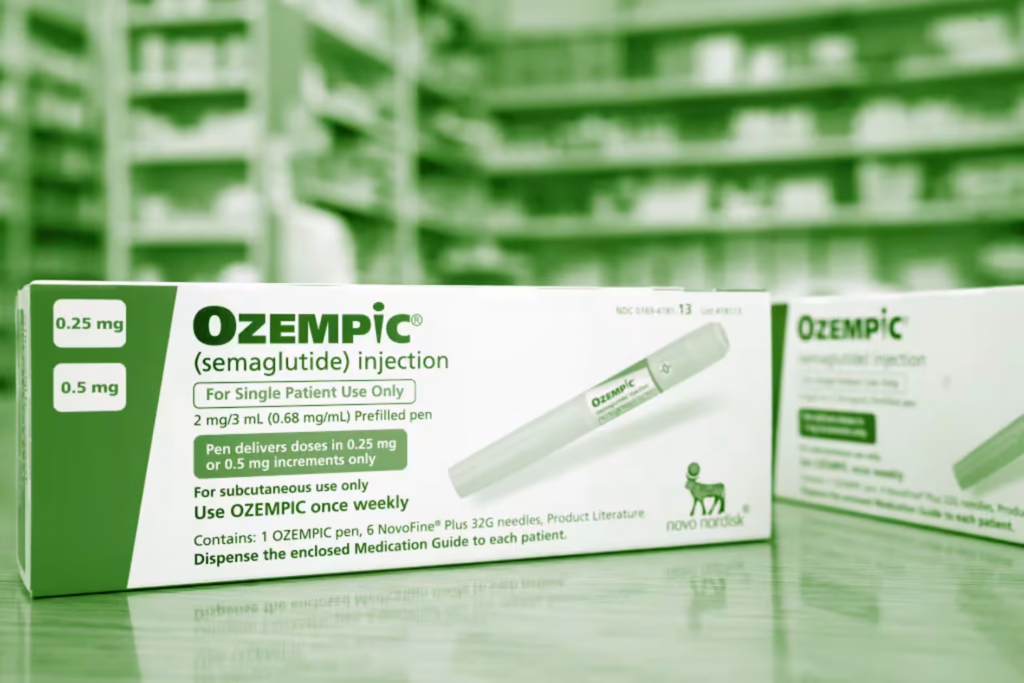In a historic attempt to increase access to the pricey blockbuster therapies, President Donald Trump struck agreements with Eli Lilly and Novo Nordisk on Thursday to lower the costs of certain of their obesity medications, including forthcoming pharmaceuticals.
In 2026, the agreements would lower the cost of so-called GLP-1 medications for Medicare and Medicaid recipients. Additionally, the therapies will be made available to customers at a reduced price on TrumpRx.gov, a website the Trump administration is opening in January.
This is a long-awaited step that might expand the market for the medications and encourage more private insurers to cover them. It means that Medicare will begin covering obesity medications for select patients for the first time starting in mid-2026. For all authorized uses of injectable and oral GLP-1 medications, including the treatment of diabetes and obesity, certain Medicare beneficiaries will be required to pay a $50 monthly fee.
During a briefing Thursday, a senior administration official who asked not to be identified informed reporters that the starting doses of future obesity drugs from Novo Nordisk and Eli Lilly, pending approvals, will be $149 per month for everyone taking them through Medicare, Medicaid, or TrumpRx.
By the end of the year, Novo Nordisk’s oral version of its obesity injection Wegovy may be available for purchase, while Eli Lilly’s pill orforglipron may be introduced the following year. Eli Lilly’s medication is being reviewed more quickly because to priority review vouchers that the Food and Drug Administration announced on Thursday.
Another senior administration official stated during the briefing that the initial dosages of current injections, such as Novo’s Wegovy and Lilly’s Zepbound, will be $350 per month on TrumpRX, but will “trend down” to $245 per month over a two-year period.
Trump stated in the Oval Office that Medicare has not reimbursed Wegovy and Zepbound for weight loss, “and Medicaid has only infrequently covered them.” Customers have frequently paid more than $1,000 a month for them, and some have paid significantly more. That will stop today.
In the Trump administration’s efforts to control the high cost of pharmaceuticals in the United States by linking them to the lowest prices overseas, the agreements are some of the most politically significant statements to date. The president has announced agreements with Pfizer, AstraZeneca, and EMD Serono to sell specific medications directly to patients at a discount in exchange for exemptions from planned pharmaceutical tariffs as part of his “most favored nation” policy.
During the briefing, Health and Human Services Secretary Robert F. Kennedy Jr. stated, “This is the biggest drug in our country, and that’s why this is the most important of all the [most favored nation] announcements we’ve made.” “The American people will be the ones most affected by this. The cost of GLP-1 medications will be the same for all Americans, even those not covered by Medicaid or Medicare.
Kennedy asserted that the increased access will have “dramatic effects on human health” in the United States and that the American population will shed 125 million pounds by this time next year.
One of the men standing behind Trump fainted, delaying the proceedings.
The current obesity medications’ list prices, which range from about $1,000 to $1,350 per month before insurance, are a major deterrent for patients, many of whom may profit from their capacity to aid in weight loss and reduce other associated health issues including sleep apnea and cardiovascular risks. Although Novo Nordisk and Eli Lilly already have programs in place to sell their weight loss medications to cash-paying customers at a discount, the latest arrangements seem to go one step further in increasing access.
The GLP-1s that Medicare currently covers for diabetes and other reasons, as well as those medications for obesity, will now cost $245 per month thanks to an agreement between Novo Nordisk and Eli Lilly. The businesses decided to offer their GLP-1 medications at reduced government prices to all 50 Medicaid programs for all covered uses, which is $245 per month for all other nonstarting doses. Some states may choose not to accept those pricing since they must opt in.
However, since Medicare is the main source of insurance for those 65 and older and covers over 66 million individuals, coverage may have a greater influence on who receives the medications. A trial program that covers the majority of participants under Medicare Part D, the program’s prescription drug programs, will make the expanded obesity drug coverage possible.
About 10% of Medicare patients will be eligible to obtain GLP-1s for obesity and cardiovascular and metabolic benefits, according to a senior administration official. Three cohorts of eligible patients will be formed. Those who are overweight, have a body mass index higher than 27, have prediabetes, or have documented cardiovascular disease are included in the first category.
People with uncontrolled hypertension, renal disease, or heart failure who are obese (BMI > 30) make up the second category. Patients with severe obesity, or those with a BMI higher than 35, make up the third category.
People who are obese or overweight with an associated ailment constitute the far larger demographic for which GLP-1s are licensed for weight loss. “We are limiting access for patients who will benefit clinically from it; we’ve worked very hard to strike a balance between broad access that just makes sure to capture patients that will benefit clinically,” the administration official stated.
The promises made by Novo Nordisk and Eli Lilly as part of the arrangements were comparable to those made by other pharmaceutical companies as part of Trump’s most favored nation accords. According to a senior administration official, the companies will offer at least U.S. net prices or most favored nation pricing on almost all primary care medications on TrumpRx, guarantee most favored nation pricing on all new medications they bring to market, and share savings from foreign drug price increases on current products.
Eli Lilly also announced on Thursday that it would reduce pricing by $50 on LillyDirect, its own direct-to-consumer channel, which currently provides Zepbound to patients who pay with cash. The lowest dose of the multidose pen of Zepbound will cost $299 per month, while higher doses would cost up to $449 per month.
Once authorized, Eli Lilly’s medication will be offered at the lowest dosage for as little as $149 a month.
A major pricing change
In a statement Thursday, Eli Lilly CEO David Ricks said the deal marks “a pivotal moment in U.S. health care policy and a defining milestone for Lilly,” which is focused on “improving outcomes, strengthening the U.S. healthcare system, and contributing to the health of our nation for generations to come.”
“Today’s announcement will bring semaglutide medicines to more American patients at a lower cost,” said Mike Doustdar, CEO of Novo Nordisk, in a separate statement. The active component of Ozempic and Wegovy is semaglutide.
The government has previously suggested that Medicare cover medications for obesity. At the close of his time, former President Joe Biden proposed a rule that would have permitted the program to cover certain therapies; however, the Trump administration declined to implement the legislation in April.
Approximately 3.4 million Medicare users would have had their access extended under Biden’s proposal. However, a congressional review revealed that it would cost taxpayers up to $35 billion over nine years, making it contentious at the time.
However, other medical professionals argue that paying for the medications could remove the subsequent expenses associated with treating illnesses linked to obesity.
The Inflation Reduction Act, which Biden signed into law in 2022, also includes semaglutide in the upcoming round of Medicare drug price negotiations. By Nov. 30, Trump is anticipated to announce the new costs of the 15 medications chosen for those negotiations.
Until the end of the decade, tirzepatide, the active component of Eli Lilly’s Zepbound and diabetic injectable Mounjaro, probably won’t be eligible for those negotiations.





